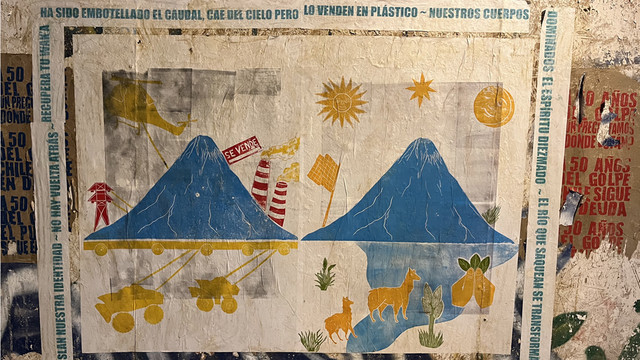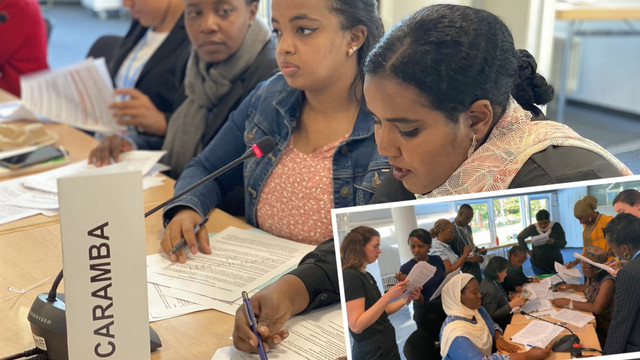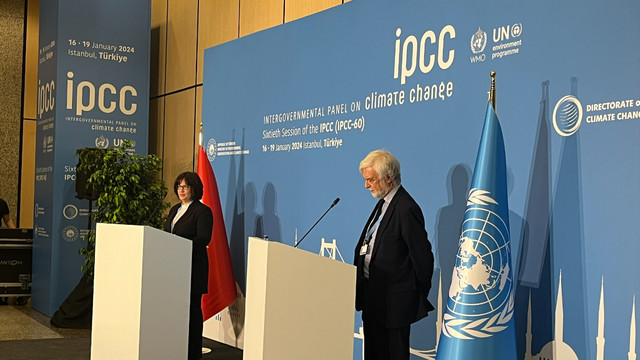Time to hear LDC voices on Post-2015 development goals
The post-2015 development agenda will most profoundly affect the least developed countries (LDCs), so it is essential that people in these countries have a greater say in what the goals look like, says Tighe Geoghegan.

Construction workers build a hotel in Ethiopia’s capital Addis Ababa. Credit: Overseas Development Institute / Antony Robbins (Creative Commons http://creativecommons.org/licenses/by-nc/2.0/deed.en_GB)
Followers of the process to develop a global agenda to replace the Millennium Development Goals after they expire in 2015 are not being starved of opinions. Everybody who’s anybody in international development has been weighing in on the issue.
UN Secretary-General Ban Ki-moon has set up a High Level Panel — comprising 27 movers and shakers and chaired by the leaders of Indonesia, Liberia and the United Kingdom — to offer guidance on what this new agenda should look like. International development NGOs have gone into overdrive with proposals on how the agenda should tackle virtually every dimension of development.
Strangely missing from this ruckus are the ideas and opinions of people in the countries that will be most directly affected by the final outcome. Yet some of the most creative responses to global challenges and interesting perspectives on development are to be found in these "least developed countries" (LDCs).
Far from being the helpless victims they are often portrayed as, LDCs have shown strong moral and intellectual leadership over the last decade in international debates around climate change, trade, debt and other issues.
As Achala Abeysinghe writes in a recent IIED Backgrounder, these countries have formed an influential bloc at the UN climate change negotiations. This LDC Group has effectively pushed to bring issues like climate finance and loss and damage to the top of the list of priority issues.
And LDCs are not just talking the talk but also walking the walk: Susannah Fisher has been documenting the innovative low carbon, climate resilient development strategies that many LDCs have embarked on over the past few years (see her report or her blog post summarising its findings).
As it became apparent that LDC perspectives were not getting an airing in all the post-2015 bloviation, a number of LDC development leaders started taking the initiative. The Centre for Policy Dialogue in Bangladesh launched Southern Voice on Post-MDG International Development Goals, a network of southern-based think tanks that is doing research and contributing opinions to inform global and national post-2015 positions.
National expertise
Another initiative is the Independent Expert Group on the Post-2015 Development Agenda (IEG), which IIED helped to convene earlier this year. The 14-member IEG, chaired by former Haitian Prime Minister Michèle Pierre-Louis, brings together expertise in many dimensions of sustainable development, from communications to climate change to community-based management.
The IEG hopes both to contribute directly to the post-2015 discussions and to stimulate more interest and discussion on the agenda in LDCs. It has already produced one short paper making the case for greater LDC engagement in post-2015 and proposing a set of priorities for LDCs to promote over the coming months.
The paper offers proposals for redefining the development assistance paradigm based on principles of true country ownership, equity, the obligation to honour commitments, respect of the contributions of all partners, accountability to beneficiaries, and mutual learning.
The paper also suggests that in the vocabulary of international cooperation, solidarity, with its connotations of a union of interests and mutual responsibility, should replace partnership, a word that has become associated with inherently inequitable relationships.
The IEG is in the process of preparing two additional papers, one that looks at post-2015 from an LDC perspective, and another that reviews what is being said by LDC stakeholders and about LDCs in the post-2015 debates. It also plans activities to support interested LDC governments and civil society groups to increase their engagement in the post-2015 process.
Opportunities ahead
Two upcoming post-2015 moments will focus attention on LDCs and offer an opportunity for their voices to be heard. On December 11-12, the Sixth Session of the UN Open Working Group on Sustainable Development Goals will look at “the needs of countries in special situations” including LDCs.
The Session will be live streamed and the background papers made available on the Sixth Session’s webpage. On 29-31 January 2014, Wilton Park in association with IIED and the UN Office of the High Representative for LDCs, Land Locked Developing Countries and Small Island Developing States (UN-OHRLLS) will hold an event to consider LDC perspectives on what kind of development framework the world needs to meet the challenges to be faced in coming decades.
The conference will bring LDC thinkers, including members of the IEG and Southern Voice, together with colleagues from UN national delegations and international organisations who directly engage the post-2015 process. These activities are rare, and therefore precious, opportunities in the post-2015 process to listen to what LDC thinkers have to say.
Tighe Geoghegan is a consultant at Green Park Consultants GPC Ltd.
Read more about IIED’s work on the Sustainable Development Goals.



